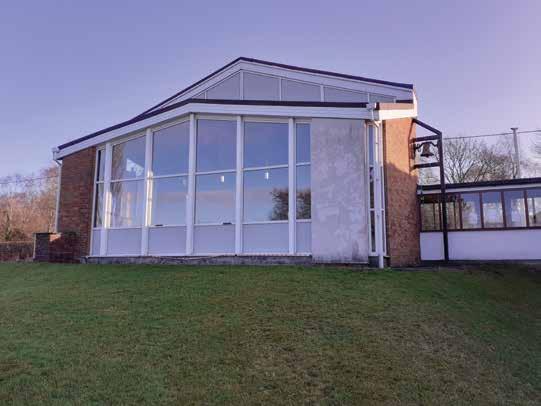
1 minute read
St Martin’s Church
St. Martin’s Church, Higher Poynton
by Stuart Bolton
Advertisement
On a recent visit to a vintage market, whilst flicking through a 1969 book titled City Building Series (the Manchester edition, published by Studio Vista) I was pleasantly surprised to see a picture of one of Poynton’s most distinctive buildings, namely St. Martin’s Church on Shrigley Road North.
The back-cover blurb tells us that the book is a ‘comprehensive guide to Manchester’s rich architectural heritage’, with over two hundred buildings listed and pictured. It pleases me therefore that this particular church, which always catches my eye as I drive past when heading for the car-park at Nelson Pit, is featured. Written by Dennis Sharp, we learn that the building was built in 1965 and that the architect was called P F Smith.
Here’s what Mr Sharp had to say about the building: ‘St. Martin’s Church, occupying an open, somewhat formless site, successfully resolves the problem of the intimate village church without recourse to conventional clichés. The pleasant well-lit interior is almost domestic in scale. The cost limit of £5,500 imposed severe limitations on the design.’ (That’s just under £100,000 in today’s money, which seems a pretty reasonable amount to me.) Most churches, of course, feature a steep and often imposing steeple but, no doubt due to the financial restrictions imposed by the brief, the architect came up with the idea of employing two contrasting roof pitches at different levels, with the raking verges to the higher level helping to create an understated alternative solution. On plan, the building is best described as a misshapen hexagon.
Sharp finishes off his short assessment with a look at the interior, ‘It is hoped that it may eventually be furnished by fittings designed by the architect.’ Whether that is the case, I have not been able to ascertain.
Today, the 55-year-old church building looks in remarkably good condition, especially when compared to other buildings constructed during that modernist 60s and 70s period (those that have survived, that is). The church is evidently much loved and well maintained. Although, judging by the moss that has started to take hold on the north-facing roof slope, the felted roof looks like it might be due for replacement soon with perhaps a smarter (GRP or single ply?) roof finish. But that’s a minor quibble on my part!
7









